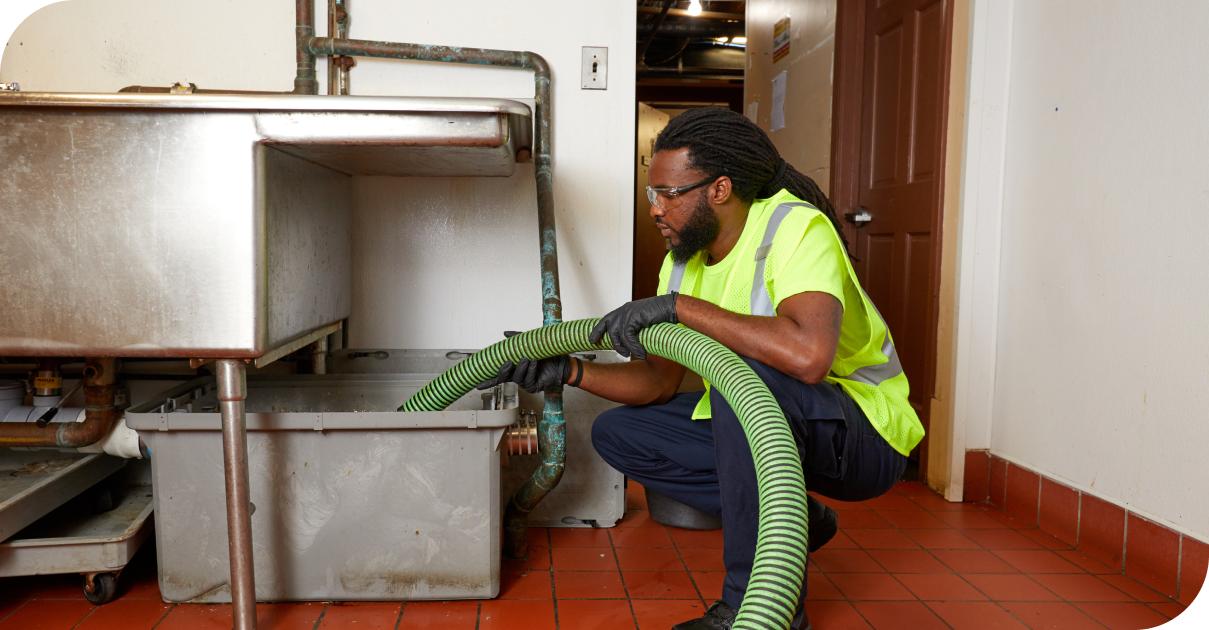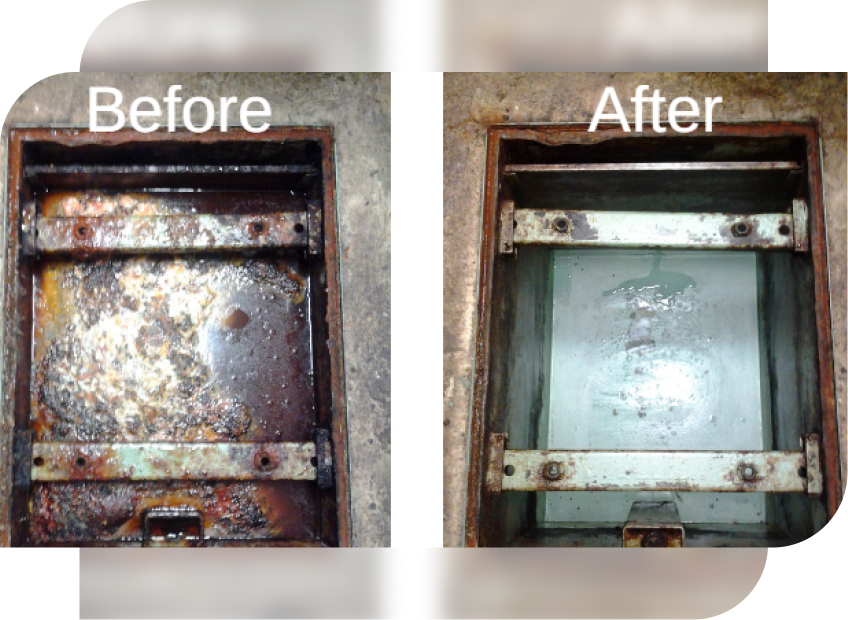

Commercial Grease Trap Services in Bayville & Berkeley Township
Grease Trap Maintenance in Central New Jersey
A grease trap is essentially a part of the restaurant’s plumbing. It filters out greases that can clog other plumbing. If a blockage occurs the rest of the sewer line in the establishment will not function properly. Hiring professionals for regular grease trap services in Bayville & Berkeley Township is essential, not only for sanitary reasons but for safety reasons as well. It can save you a lot of money as a business owner to have a regular cleaning done than have an emergency and hefty repair bills.
Types of Grease Traps
We specialize in servicing all types of grease traps, essential for maintaining a clean and efficient commercial kitchen. Grease traps come in various forms, each with unique features and benefits depending on the volume of grease your establishment generates. Understanding the differences between these types can help you choose the best solution for your kitchen.
The types of grease traps we service:
- Passive Grease Traps: Commonly used under sinks, these traps rely on gravity to separate grease from water.
- Interceptor Grease Traps: Larger units made of durable materials like concrete, steel, or fiberglass, designed for high-capacity grease management.
- Grease Recovery Devices (GRD): High-efficiency systems that skim grease from wastewater, ensuring up to 99% grease and fat removal.
What Are the Consequences of Not Properly Maintaining a Grease Trap?
Failing to properly maintain a grease trap in New Jersey can spell trouble for businesses. Initially, this negligence might result in breaking state regulations, bringing along fines and penalties. Furthermore, a neglected grease trap could cause blockages and plumbing backups, translating into expensive repair bills. The environmental repercussions are notable too, with unregulated grease discharge posing a threat to local water systems.
It emphasizes the vital importance of consistent and proper maintenance, not just for adherence to regulations but also to steer clear of disruptions and potential financial setbacks.
What Factors Determine the Cost of Grease Trap Cleaning Services in Bayville & Berkeley Township?
Several factors impact the cost of grease trap cleaning services in Bayville & Berkeley Township, each contributing to the overall expense of maintaining a properly functioning system. The primary factor is the size and capacity of the grease trap; larger traps require more extensive cleaning and therefore incur higher costs. The frequency of cleaning is also crucial; establishments with higher kitchen activity generate more grease, necessitating more frequent services.
The complexity of access to the grease trap can further affect pricing; if the trap is difficult to reach or located in a cramped area, additional labor and equipment may be needed. Additionally, the level of grease buildup influences the cleaning effort required, with heavily clogged traps demanding more intensive work. Lastly, different types of grease traps have varying cleaning requirements, which can also impact costs. Understanding these factors helps in assessing the true cost of grease trap maintenance.
Here are the detailed factors that determine the cost:
- Size and Capacity: Larger grease traps hold more grease and require more time and resources to clean thoroughly.
- Frequency of Cleaning: Higher kitchen activity levels necessitate more frequent cleanings, affecting overall costs.
- Type of Establishment: Restaurants with high grease output may incur higher cleaning costs compared to smaller food service operations.
- Ease of Access: Traps that are difficult to access or located in challenging areas require additional labor and equipment, increasing costs.
- Level of Grease Buildup: Heavily clogged traps need more extensive cleaning efforts and specialized equipment.
- Type of Grease Trap: Passive grease traps, interceptors, and Grease Recovery Devices (GRD) have different cleaning requirements and associated costs.
Give us a call at (732) 624-6100 or fill out our online contact form to schedule a Central NJ grease trap service today!
-
Unrivaled NetworkOver 1,100 experts, 1,000 vehicles, and 100 local teams united.
-
Complete SolutionsFrom clogged drains to flooded streets, we've got you covered.
-
Legacy of ServiceOver 75 years of dedication to our valued customers.
-
Real-Time UpdatesReceive detailed reports and real-time reporting from our technicians.

How Are Grease Traps Cleaned?
The process of cleaning grease traps begins with removing the lid and ladling off the top layer. The baffles should then be scraped and thoroughly cleaned. Once the baffles have been properly cleaned, the bottom of the trap must be cleaned. A strainer is used along the sides and bottom to remove any particles and food debris. Once all of the debris and particles are cleared, the bypass vent must be cleaned with flexible wire. After all of these processes are complete, the baffle and cover can be put back on.
It is important to remember that not all traps are built in the same way. Affordable Pumping Services can provide a quote prior to entering into a service agreement, which will include any special charges for non-traditional equipment. Proper grease trap maintenance, both interior and exterior, is a must if your establishment uses oil or grease in food preparation. All grease traps need periodic pumping and maintenance in order to prevent your pipes from backing up.

Hear From Our Happy Customers
-
“We got service from Kim and she is knowledgeable and professional. I highly recommend it.”- Asian Bistro
-
“Couldn't have been happier with the staff from the inside and out thank you!”- Ilan B.
-
“- JB
Amazing response time on a holiday no less and their employees are very kind individuals that stride to do the job right the first time.
” -
“Most of all they cleaned out and checked my tanks after cleaning to make sure the job was completed. Thank you Armondo!”- Jane R.
-
“He was on time and a good person. He also worked very hard, great company..”- Len S.

-
Let’s Keep Life Flowing!Contact UsJust need Home Septic Pumping? Book Online

.2410110853561.png)